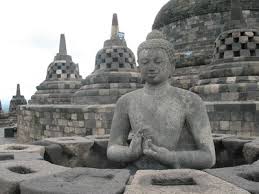Borobudur is one of the
greatest Buddhist monuments in the world. Founded by a king of the Saliendra
dynasty, it was built to honour the glory of both the Buddha and its founder, a
true king Bodhisattva. The name Borobudur is believed to have been derived from
the Sanskrit words vihara Buddha uhr, meaning the Buddhist monastery on
the hill
Borobudur, is a 9th-century Mahayana Buddhist Temple in Magelang, Central
Java, Indonesia. The monument consists of six square platforms topped by
three circular platforms, and is decorated with 2,672 relief panels
and 504 Buddha statues. A main dome, located at the center of the top
platform, is surrounded by 72 Buddha statues seated inside a perforated stupa.
The Borobudur Temple
Compounds is one of the greatest Buddhist monuments in the world, and was built
in the 8th and 9th centuries AD during the reign of the Syailendra Dynasty.
Borobudur Temple was built
by Sailendra dynasty between 750 and 842 AD. In terms of world wide religious structures,
it was very early, it would be 300 years before Cambodia’s Angkor Wat was
constructed, 400 years before work began on the great European cathedrals.
The main temple is a stupa
built in three tiers around a hill which was a natural centre: a pyramidal base
with five concentric square terraces, the trunk of a cone with three circular
platforms and, at the top, a monumental stupa. The walls and balustrades are
decorated with fine low reliefs, covering a total surface area of 2,520 m2.
Around the circular platforms are 72 openwork stupas, each containing a statue
of the Buddha.
The vertical division of
Borobudur Temple into base, body, and superstructure perfectly accords with the
conception of the Universe in Buddhist cosmology. It is believed that the
universe is divided into three superimposing spheres, kamadhatu, rupadhatu,
and arupadhatu, representing respectively the sphere of desires where
we are bound to our desires, the sphere of forms where we
abandon our desires but are still bound to name and form, and the sphere
of formlessness where there is no longer either name or form. At Borobudur
Temple, the kamadhatu is represented by the base, the rupadhatu by
the five square terraces, and the arupadhatu by the three circular
platforms as well as the big stupa. The whole structure shows a unique blending
of the very central ideas of ancestor worship, related to the idea of a
terraced mountain, combined with the Buddhist concept of attaining Nirvana.
The Temple should also be
seen as an outstanding dynastic monument of the Syailendra Dynasty that ruled
Java for around five centuries until the 10th century.
The Borobudur Temple
Compounds consists of three monuments: namely the Borobudur Temple and
two smaller temples situatued to the east on a straight axis to Borobudur. The
two temples are Mendut Temple, whose depiction of Buddha is represented by a
formidable monolith accompanied by two Bodhisattvas, and Pawon Temple, a
smaller temple whose inner space does not reveal which deity might have been
the object of worship. Those three monuments represent phases in the attainment
of Nirvana.
The temple was used as a
Buddhist temple from its construction until sometime between the 10th and 15th
centuries when it was abandoned. Since its re-discovery in the 19th century and
restoration in the 20th century, it has been brought back into a Buddhist
archaeological site.
Where is location.
Borobudur Temple is located
42 km northwest of Yogyakarta, 7 km south of the town of Magelang, Central Java.
The monument is located in the Kedu Valley, in the southern part of Central
Java, Indonesia.
How to get there.
Access to the area is easy
by plane, train, or buses. Once in the region, given the driving conditions, it
is recommended you hire one of the many local drivers rather than rent your own
vehicle.
You can also
take public transport. Go by bus or minibus from Joga Bus terminal. There
direct Bus (Micro Bus) serves daily every 10 minutes from Jogja to
Borobudur. The very well known Bus is named, CEMARA TUNGGAL, cost only about Rp, 14.000,- (one way).
When you take this micro bus, please get down at MENDUT temple.
Afterwards, you can walk or take horse cart from to PAWON TEMPLE. From Pawon
temple is only 300 meters to BOROBUDUR TEMPLE.
Where to stay ?
See this website here to figure
out the best homestay for you. There are more than 30 Places to Stay near Borobudur Temple.

